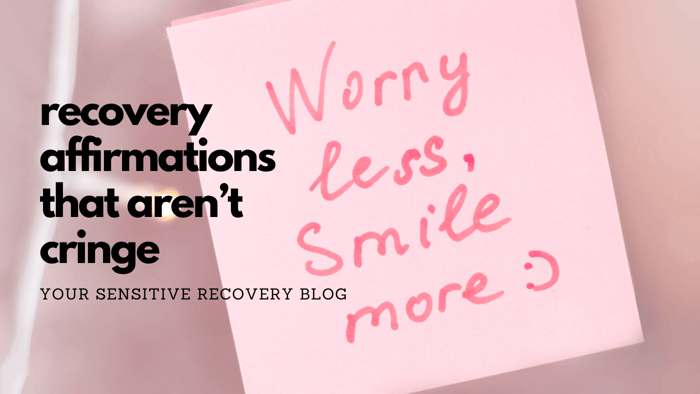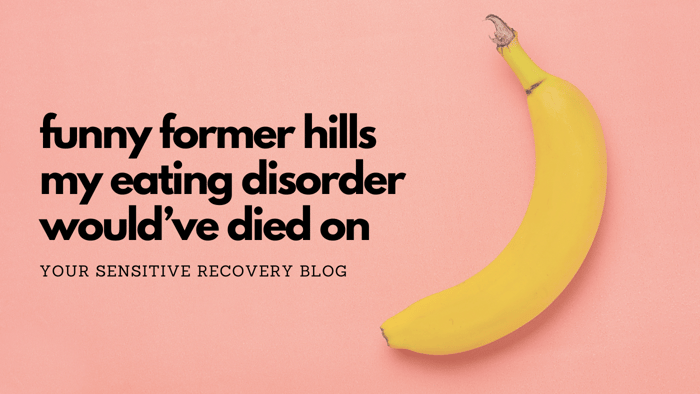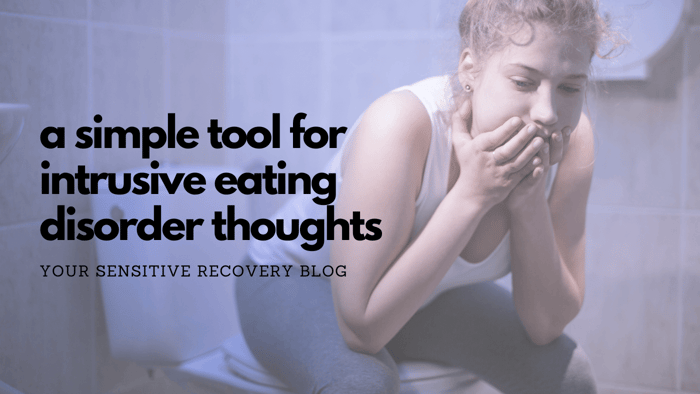Affirmations can be powerful tools in your eating disorder recovery toolkit, but most of them are, well...cringe. I too have been known to stand in front of the mirror, repeating phrases that made me feel absolutely ridiculous.
Cue the eye-rolling.
But wait. What if I told you that affirmations DO work, but that you're probably just doing them wrong?
Read on to learn...
👉 why affirmations can really change your life
👉 what makes them suck, and
👉 how a few magic words can make them feel honest, believable, and palatable.
Counteracting The Negative Bias
Negative bias is what we call our brains' fun little tendency to focus more on negative information than positive. Have you ever noticed that most people's first memories from childhood seem to be frightening or painful? This is because of negative bias. My two earliest memories, for example, are taking a tumble down the stairs in my walker (ouch) and accidentally going underwater for the first time in a baby pool (cough, cough, sputter). It sounds crappy, but negative bias is simply our brains' way of keeping us safe from potential threats.
Unfortunately, it often means we focus too much on the negative side of things.
In psychology-land, affirmations are an effective way of training our brain to adopt a more positive outlook and approach to life.
When we think certain thoughts, especially repetitively, we affirm them, and they become our truth. Whether you know it or not, you're already practicing affirmations - but are they the right affirmations?
You may be unwittingly affirming...
"I'm such a bad sleeper" or, "I don't have the body for a bikini" or, "I'm so behind in life."
You KNOW, of course, that these thoughts aren't exactly helpful. But do you know how damaging they really are?
Your Subconscious is Listening
To the subconscious, our thoughts are everything, and language is key. We often have thoughts that sound like definitive facts - and that has a massive impact on how we feel, and even how our bodies respond.
When we have definitive internal dialogue like this, our subconscious minds hear these statements almost like directions.
And what do they try to do? Everything they can to make those statements become or stay true! Because we all want to be right about what we think! We all want to be able to trust our thoughts.
This is especially true when you verbalize or write negative statements because you're activating so many neural pathways in the process. You're speaking the words, hearing yourself speak the words, writing the words, seeing yourself write the words...
Smart Brains Won't Be Fooled
Unfortunately (or, fortunately), our brains know when we're just lying to ourselves. This is precisely why people feel really cringe when they're repeating affirmations, and why they just don't seem to do anything.
Your brain isn't dumb.
If you are depressed, out of work, and reeling from a breakup, an affirmation like, "My life is amazing and uplifting" is just not gonna cut it. I can see your brain eye-rolling from here. Quality affirmations need to be HELPFUL and TRUE.
"Ok but how can I make affirmations true and positive if my life actually sucks, NOW?"
Magic Words for Cringe-Free Affirmations
It's easier than you think. Add these magic words to take your Affirmation Game from ho-hum to awe-some. (Yes, you can cringe at my rhyme. I don't mind. 😉 )
- "I am working on..." For example: Instead of, "I love and respect my body", make it, "I am working on loving and respecting my body."
- "I am excited for when..." For example: Instead of, "I have a peaceful relationship with food", make it, "I am excited for when I have a peaceful relationship with food ."
- "I look forward to..." For example: Instead of, "I no longer binge", make it, "I look forward to when I no longer binge."
- "I choose today to start believing..." For example: Instead of, "I am worthy of love", make it, "I choose today to start believing that I am worthy of love."
Remember how I said that verbalizing and writing negative statements are dangerously powerful? Well, doing the same for positive statements is wonderfully powerful. Again, you're activating more parts of your brain if you say your affirmations out loud and write them down. So have it!
Go affirm your way to a better life, friends. You've got this! 🪄
✨ Josie Munroe, LMFT is a licensed therapist and owner of JosieMunroe.com and Your Sensitive Recovery As a recovered clinician and Highly Sensitive Person, she loves supporting others on their journeys to form new, empowered relationships with food, their bodies, and their sensitivity. Join the newsletter for a weekly boost of hope and inspiration. You deserve a recovery that works for you! ✨





